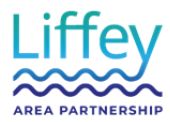Liffey Partnership / Cherry Orchard Implementation Board: Expression of Interest

Development of an Innovative Social Enterprise Approach for the Proposed Village-Centre Commercial Development Spaces in Cherry rchard
Expression of Interest (Independent Contractor)
The Cherry Orchard Implementation Board (COIB) is a cross-governmental initiative with senior representatives from multiple state agencies and local representatives. Established by the Minister for Justice, Helen McEntee in 2023, the COIB is tasked with addressing the challenges facing Cherry Orchard and intensifying interventions where needed through community cooperation and service coordination.
The Liffey Partnership (LP) was set up in 1996 as a response to long-term unemployment and poverty. As part of the development of this response, Liffey Partnership delivers a range of programmes with the aim of reducing poverty and promoting social inclusion. Liffey Partnership’s range of programming includes employment services, child and family supports, health promotion, community development, supporting self-employment and social enterprise and more.
Liffey Partnership, on behalf of the Cherry Orchard Implementation Board, are inviting expressions of interest to develop an innovative vision and proposal for a planned village-centre in Cherry Orchard incorporating commercial spaces with social enterprise at the core.
Aims
The LP and COIB hope to receive expressions of interest in developing a proposed vision for the planned commercial development spaces in Cherry Orchard based on social enterprise as a core methodology in developing a village centre. The proposal is expected to:
- Explore and set out models of social enterprise inside and outside of Ireland that have sought to rejuvenate urban settings, with recommendations as to their transferability to the Cherry Orchard setting.
- Support the development of an attractive village centre in the heart of Cherry Orchard using a social enterprise approach as an alternative model to market-only driven model of enterprise in a planned build environment location: Opposite St Ultan’s School - Here
- Explore how social enterprise models can be used to strengthen local well-being, identity, culture, pride of place, connectivity, community cohesion and capacity for place-making.
- Produce a plan illustrating how to grow a village centre using social enterprise principles, that sets out types of suitable, viable and potentially complementary social enterprises
- The plan should be informed by climate justice, and the values of community wealth building and circular economy principles.
- Set out and address potential barriers and how they could be overcome.
- The plan should contain the following key stages: pre-development requirements (including planning, resourcing, and capacity building), required timelines, finance, and stakeholder commitments with reference to sustainability requirements.
Submissions are welcomed from suitably qualified individuals and organisations particularly those who possess expertise and passion for social enterprise as a way of building and resourcing communities. The successful tenderer will be employed as an independent contractor.
Application Process:
Provide a proposal encapsulating the above aims. Proposals should include.
- An overview of the proposed methodology and projected timelines
- Outline a budget for the work, (a maximum budget up to €20,000) inclusive of all costs including VAT will be considered)
- Include CV and cover letter outlining relevant experience with examples of previous work.
- Tax clearance certificate/number.
Applications should be sent to Teresa Dunphy, Liffey Partnership, 4 Drumfinn Park, Ballyfermot or by email to tdunphy@liffeypartnership.ie by 4pm on Friday 31st August 2024.
Interviews of shortlisted candidates will take place on 10th September 2024 in Ballyfermot.
Glossary
Social Enterprise - Social enterprises are businesses that work primarily to improve the lives of people. Their core objective is to achieve a social, societal, or environmental impact. They frequently work to support disadvantaged groups such as the long-term unemployed, people with disabilities, Travellers, etc., or to address issues such as food poverty, social housing, or environmental matters. DRCD
Reference materials may include:
- Cherry Orchard Implementation Board Progress Report and Draft Action Plan 2024
- https://scsi.ie/rejuvenating-irelands-small-town-centres-report/
- https://lda.ie/projects/cherry-orchard
- https://cles.org.uk/community-wealth-building/how-to-build-community-we…
- https://www.chicago.gov/content/dam/city/sites/community-wealth-buildin…
- https://community-wealth.org/content/cleveland-model-how-evergreen-coop…
- https://cles.org.uk/wp-content/uploads/2019/07/CLES_Preston-Document_WE…
